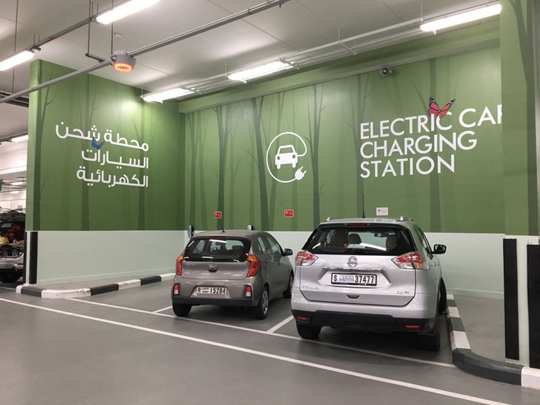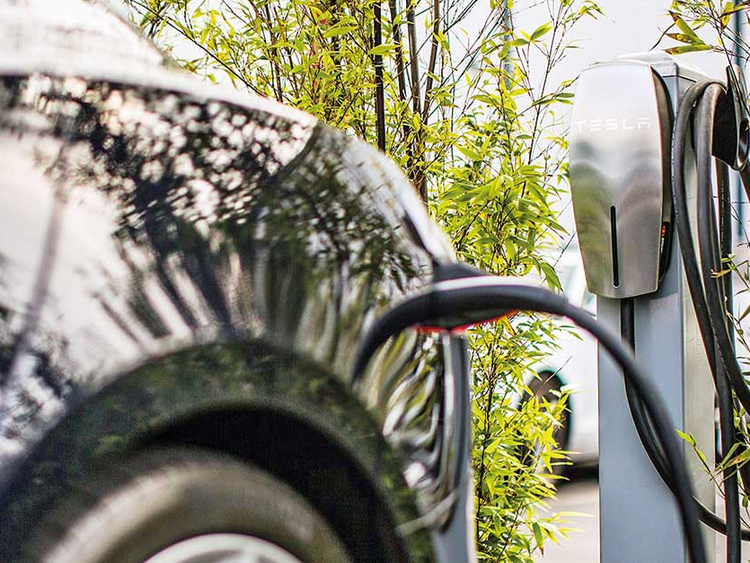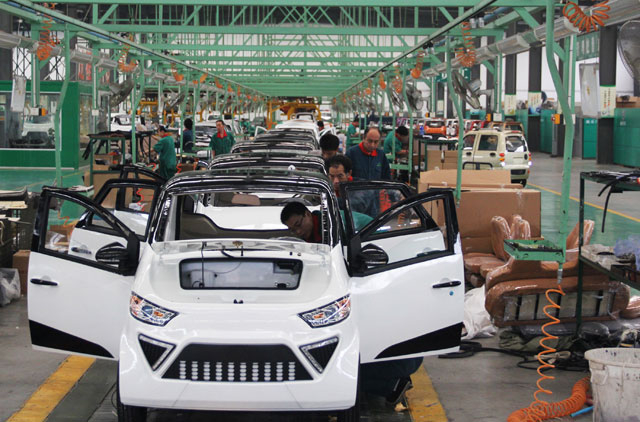
Dubai: “Where’s the charger?”
That’s a piece of conversation heard in homes and workplaces whenever a smartphone needs juicing up.
But now, more UAE residents are likely to ask the same question while on the road ... and it will be for their cars.
The UAE’s automotive market is getting busy making just those connections for an electric future.
ALSO READ:
200 e-vehicle charging stations in Dubai soon
New rules for electric car chargers
Get ready for Tesla taxis in Dubai
Tesla working on new Dubai service centre
Tesla car charging stations in Dubai
With Tesla having opened its first UAE store at a prominent location on Shaikh Zayed Road in Dubai on Wednesday (July 12), the talk in automotive circles is no longer confined to what the power engines can pack in, the addictive burr of a turbo-charge or the bespoke luxury trims one can fit into a car’s interior.
Conversations are just as likely to shift to the size of the battery and the distance that it could allow an electric car to get through.
And with electric models starting to arrive and grab attention, the UAE is rolling out the charging stations.
'Supercharger' sites in UAE
To the two “supercharger” sites already in place, the UAE will add another three before the year end, which will help charge up a vehicle in a matter of minutes.
A further 18 “destination charging” stations will be built in the next six months to keep company with the 32 already set up. And more should be on the way as UAE government entities — and citizens — sign up for an electric drive.
And private entities, too, are stepping up to the plate in spreading the charging network.
The upscale developer Seven Tides installed Tesla destination charging connectors at three of its Dubai properties, which includes the Anantara The Palm Dubai Resort and the Mövenpick Hotel Ibn Battuta Gate.
Located at the entrance to each hotel, the stations allow any car owner to plug in and add up to 90 kilometres per hour range to the battery.
Free chargers
“We are happy to offer these charging stations across our properties for free,” said Abdullah Bin Sulayem, CEO of Seven Tides, in a statement at the time. And Bin Sulayem himself owns two Teslas, a 2016 Model X and a 2014 Model S.
He is not the only developer to do so. Faris Saeed of Diamond Developers has a Tesla parked in his garage and got charging stations lined up at the company’s Sustainable City project in Dubailand.
As with Apple and its iPhone releases, there are many UAE residents who did not wait around for Tesla to make a formal entry into this market before getting behind one of the models.
In fact, market sources say a “fair” number of models were shipped in over the last two years, a process helped by the appearance of more charging locations across the city. In the world of automotive, Tesla brings in the frenetic energy more associated with a technology superstar.
In terms of its stock market performance, it sure is the case, with early April seeing Tesla vault past General Motors to being the US carmaker with the highest market cap, and last month even eased past BMW, though fleetingly.
It would be interesting to know how many in the UAE have already put up down payments — or are likely to — for the entry-level Model 3, which is due in this market only by mid-2018.
Prices for the Model 3 start from $35,000 (Dh128,555), making it the most accessible Tesla compared with the Model S’ Dh281,350 and the Dh332,500 for the Model X, which is the SUV.
Support
But for electric vehicles to develop into something more than a niche among those who can afford it, government entities need to play a central role.
“In Jordan there is a defined governmental demand,” said a top official with a German carmaker.
“How electro mobility develops in the region and how one day the market expands (for electric cars) will depend on such support from others. We are starting to see some of that in the UAE, especially within the smart city concepts.”
In Dubai, government entities have already signed up for the transition. In February, when Tesla first confirmed its entry into Dubai, the RTA (Road and Transport Authority) said it will buy 200 units for its taxis. And not just that, government agencies with sizeable fleets of their own will need 10 per cent of their new additions to be either electric or hybrid.
Gains are starting to be seen even on hybrids. Al-Futtaim Motors, the dealership for Toyota, recently said Prius sales in the UAE were up 535 per cent in the first six months.
It was early last year that the Prius, something of a legend in hybrids’ pecking order, was launched in the UAE, with starting prices from Dh89,000.
Hybrids
“The positive growth for Prius — and the Camry Hybrid — are proof that customers are becoming increasingly aware of the environmental and financial benefits of owning hybrid cars,” Saud Abbasi, Managing Director at Al-Futtaim Motors, said in a statement.
“Studies show that a person could save up to one tonne of CO2 using his Prius for a year, while a fleet of hybrid taxi cars could save over 30 per cent on fuel while emitting over 30 per cent less CO2.” (Launch prices were from Dh89,000.)
If local buyers want something much further up the price options, there are quite a few vying for attention.
Aston Martin has just announced its all-electric entry, with the RapidE, and with a price tag likely to be north of $250,000 and with a 2019 availability. Rolls-Royce also said it will be heading full tilt into an electric powertrain rather than spend time on hybrids.
But one British supercar marque did benefit quite a bit from making a hybrid stopover.
There were only 375 units of the McLaren’s P1 — featuring a 3.8-litre twin-turbo V8 petrol engine — and was able to generate interest from regional buyers from the moment it was announced. Of the production, an estimated 30 per cent was shipped out to these markets. The cost — $1.3 million apiece.
When the Tesla Model 3 makes it here, priced close enough to the $35,000 it lists for in the US, car owners here would have a wider selection of models and prices to pick up from.
The real electric car revolution will start then in real earnest. In the meantime, keep charging.
Global automotive industry keeps pushing the limits on electric:
Tesla Model S and Model X
Convince potential owners that they can get enough range from a charge — that’s the challenge electric carmakers have to contend with. For the Model S and Model X, Tesla has put such doubts to rest. The former has a European standard of up to 632 kilometres, while the Model x can turn in up to 565 kilometres. It is to be seen what sort of variations there could be under local conditions, especially of the harsh weather variety.
BMW i8
BMW is expanding its “i” family with the i8 Roadster next year. And the carmaker is promising a “whole new dimension in pioneering open-top driving pleasure — virtually silent and with zero local emissions”.
Aston Martin RapidE
Aston Martin’s RapidE will enter production in 2019, and will have a limited production of 155 cars. It will deliver “four-door sports car looks and dynamics of the Rapide S, with all-electric powertrain replacing the six-litre V12 engine”.
-M. N.













